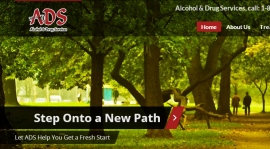 There are many hundreds of methadone clinics in operation across the entire United States. Wherever there is addiction, there are suffering addicts and concerned friends and family in search of answers … and treatment.
There are many hundreds of methadone clinics in operation across the entire United States. Wherever there is addiction, there are suffering addicts and concerned friends and family in search of answers … and treatment.
Methadone.US would like to profile a highly regarded opioid treatment program located in Greensboro, North Carolina. This program is part of a non-profit substance abuse services agency known as Alcohol and Drug Services (ADS).
ADS has been helping the Guilford County and surrounding Triad community for over 40 years. While ADS offers a range of addiction treatment and drug prevention programs, they excel in the area of treating opioid addiction through a combined use of opioid replacement medication (methadone) and structured counseling.
ADS has achieved CARF accreditation, is licensed by the State of North Carolina’s Division of Health and Human Services, and is an approved Medicaid and multi-MCO authorized provider. But ADS’ most outstanding accomplishment is the depth and quality of their opioid program services and the professionalism of their compassionate & committed staff.
Methadone medication offers safe & effective relief from opioid withdrawal symptoms when properly administered through a quality, structured program. Unfortunately, some methadone clinics are too lite on their counseling and case support components, which are key ingredients in any comprehensive opioid treatment program.
ADS has a longstanding history of helping clients gain a thorough knowledge of their addictive illness and in helping clients to develop valuable coping skills for managing their lives and achieving personal goals. ADS treats indigent and low income patients who might otherwise be unable to pay for methadone services out-of-pocket. The ADS Methadone Program offers psychiatric services, limited medical services, free HIV testing, and substantial case support assistance to help with major issues like housing placement.
Alcohol and Drug Services’ methadone program in Greensboro, NC is comparatively small in relation to some of the local private, for-profit methadone clinics. ADS typically serve between 180-200 active clients.
The organization recently launched a new website to inform the community of their various programs. The website is: www.ADSyes.org. The agency gratefully accepts charitable donations of any amount through their website.
Visit the ADS Blog and the ADS Google + Page

 Follow
Follow

 The decision to utilize methadone dosing to manage opioid withdrawal is a choice that will require considerable personal commitment. As methadone dispensing for opiate addiction occurs within the structure of a methadone clinic, each patient must travel to the clinic daily to check-in and receive their medication in person under supervision.
The decision to utilize methadone dosing to manage opioid withdrawal is a choice that will require considerable personal commitment. As methadone dispensing for opiate addiction occurs within the structure of a methadone clinic, each patient must travel to the clinic daily to check-in and receive their medication in person under supervision. Many clients in methadone programs have co-occurring disorders like depression, anxiety, or adult attention deficit disorder (ADD). Historically, clinics have attempted to treat psychiatric symptoms with established, FDA-approved psychotropic medications which have proven useful across many settings in managing symptoms.
Many clients in methadone programs have co-occurring disorders like depression, anxiety, or adult attention deficit disorder (ADD). Historically, clinics have attempted to treat psychiatric symptoms with established, FDA-approved psychotropic medications which have proven useful across many settings in managing symptoms. An article was brought to our attention by Dr. Dana Jane Saltzman, a New York City physician who specializes in the treatment of opioid addiction. Dr. Saltzman uses suboxone in her private practice to help those seeking recovery from a severe opioid habit.
An article was brought to our attention by Dr. Dana Jane Saltzman, a New York City physician who specializes in the treatment of opioid addiction. Dr. Saltzman uses suboxone in her private practice to help those seeking recovery from a severe opioid habit. To be curious is a basic part of human nature. We live each day naturally drawn to things which interest us, which feel good physically or emotionally, or which might incite some curious inclination down inside of us. It is literally wired into the human DNA to be inquisitive and to seek new experiences.
To be curious is a basic part of human nature. We live each day naturally drawn to things which interest us, which feel good physically or emotionally, or which might incite some curious inclination down inside of us. It is literally wired into the human DNA to be inquisitive and to seek new experiences.


